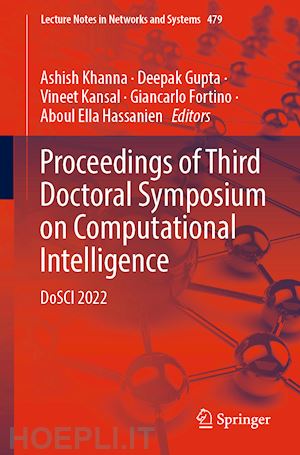
Questo prodotto usufruisce delle SPEDIZIONI GRATIS
selezionando l'opzione Corriere Veloce in fase di ordine.
Pagabile anche con Carta della cultura giovani e del merito, 18App Bonus Cultura e Carta del Docente
This book features high-quality research papers presented at Third Doctoral Symposium on Computational Intelligence (DoSCI 2022), organized by Institute of Engineering and Technology (IET), AKTU, Lucknow, India, on March 5, 2022. This book discusses the topics such as computational intelligence, artificial intelligence, deep learning, evolutionary algorithms, swarm intelligence, fuzzy sets and vague sets, rough set theoretic approaches, quantum inspired computational intelligence, hybrid computational intelligence, machine learning, computer vision, soft computing, distributed computing, parallel and grid computing, cloud computing, high performance computing, biomedical computing, and decision support and decision making.
Dr. Ashish Khanna [M’19, SM’20] has received his Ph.D. degree from National Institute of Technology, Kurukshetra in March 2017. He has completed his PDF from Internet of Things Lab at Inatel, Brazil. He is part of AD Scientific World ranking report as a leading researcher. He has around 170 accepted and published research papers and book chapters in reputed SCI, Scopus journals, conferences and reputed book series including 90 papers accepted and published in SCI indexed Journals and Cumulative Impact Factor of above 350. He also has 10 published Patents to his credit. Additionally, He has co-authored, edited and currently editing around 50 books. He has also served as a keynote speaker, resource person and given several invited talks at national and international events. He has worked as Guest Editor in several reputed journals and served as Series Editor in publishing houses like De Gruyter (Germany), Elsevier and CRC Press. He is also acting as a consulting editor for Elsevier. His research interests include Distributed Systems and its variants, AI and many more. He is the recipient of the 2021 IEEE System Council Best Paper Award. He is serving as convener/ General chair in some springer and other international conferences series like ICICC, ICDAM, DoSCI, ICCCN, ICIIP and many more. He has played a key role in promoting and initiating several startups and is also a startup consultant. He organized ``WHERE STARTUP MEETS INVESTOR '' in collaboration with Universal Inovator and SIIF SSCBS, Delhi University under the banner of ICICC-2020, an international conference. He also organized conference on Patents (ICIIP) in association with UI and IGDTUW Delhi. His Google scholar index is around 4500 with h index of around 40. He is also founder of Bhavya Publication house and Universal Inovator an Indian Research Lab.
Dr. Deepak Gupta received a B.Tech. degree in 2006 from the Guru Gobind Singh Indraprastha University, Delhi, India. He received M.E. degree in 2010 from Delhi Technological University, India and Ph. D. degree in 2017 from Dr. APJ Abdul Kalam Technical University (AKTU), Lucknow, India. He has completed his Post-Doc from National Institute of Telecommunications (Inatel), Brazil, in 2018. He is the recipient of 2021 IEEE System Council Best Paper Award and Highly Cited Paper Award in Applied Sciences Journal. He have been featured in the list of top 2% scientist/researcher database in the world consecutively for the second time [Table-S7-singleyr-2019, Table_T1_2020]. He is Treasurer of the IEEE ComSoc-Delhi Executive Committee. He has co-authored 189 journal articles including 150 SCI papers and 51 conference articles. He has authored/edited 59 books, published by IEEE-Wiley, Elsevier, Springer, Wiley, CRC Press, DeGruyter and Katsons. He has filed four Indian patents. He is convener of ICICC, ICDAM & DoSCI Springer conferences series. Currently, he is Editor-in-Chief of ICSES Interdisciplinary Transactions on Cloud Computing, IoT and Big Data and Associate Editor of Expert Systems (Wiley), and Intelligent Decision Technologies (IOS Press). He is also working toward promoting startups and also serving as a startup consultant. He is also a series editor of “Elsevier Biomedical Engineering” at Academic Press, Elsevier, “Intelligent Biomedical Data Analysis” at De Gruyter, Germany, “Explainable AI (XAI) for Engineering Applications” at CRC Press and "Computational Intelligence for Data Analysis" (Bentham Science). He is appointed as Consulting Editor at Elsevier.
Prof. Vineet Kansal has graduated in Computer Engineering from the GB Pant University of Agriculture and Technology, Pantnagar, and earned his MTech and PhD from IIT Delhi. He has been in academics for around 30 years. Currently, Dr Kansal is Professor at Institute of Engineering Technology, Lucknow. He has been Dean (UGSE) & Pro Vice Chancellor at the Dr. APJ Abdul Kalam Technical University, Lucknow. His area of research interest includes data analytics, machine learning, artificial intelligence, networking, cloud computing, big data analytics and optimization.
Giancarlo Fortino (IEEE Fellow 22) is Full Professor of Computer Engineering at the Dept of Informatics, Modeling, Electronics, and Systems of the University of Calabria (Unical), Italy. He received a PhD in Computer Engineering from Unical in 2000. He is also distinguished professor at Wuhan University of Technology and Huazhong Agricultural University (China), high-end expert at HUST (China), senior research fellow at the Italian ICAR-CNR Institute, CAS PIFI visiting scientist at SIAT – Shenzhen, and Distinguished Lecturer for IEEE Sensors Council. At Unical, he is the Rector’s delegate to Int’l relations, the chair of the PhD School in ICT, the director of the Postgraduate Master course in INTER-IoT, and the director of the SPEME lab as well as co-ch











Il sito utilizza cookie ed altri strumenti di tracciamento che raccolgono informazioni dal dispositivo dell’utente. Oltre ai cookie tecnici ed analitici aggregati, strettamente necessari per il funzionamento di questo sito web, previo consenso dell’utente possono essere installati cookie di profilazione e marketing e cookie dei social media. Cliccando su “Accetto tutti i cookie” saranno attivate tutte le categorie di cookie. Per accettare solo deterninate categorie di cookie, cliccare invece su “Impostazioni cookie”. Chiudendo il banner o continuando a navigare saranno installati solo cookie tecnici. Per maggiori dettagli, consultare la Cookie Policy.